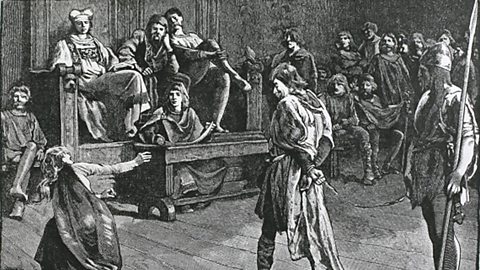Communal methods of combatting crime in Saxon and medieval times
In the Saxon period and the earlier part of the medieval era, policing was done within communities. This was because most people lived in small villages and would have known everyone that they lived near.
These communities were divided into tithings. Each tithing was made up of ten men from different families. They would deal with local disturbances and were expected to report any offences committed by members of the tithing so that the people could be punished.
Each tithing was led by a tithingman. The hue and cryA method of raising the alarm to the rest of the village after a crime had been committed, usually by shouting loudly. was raised to begin the process of finding people who had tried to escape from justice. Each group of ten tithings was organised into a hundred, which dealt with more serious offences.
England had been divided into shires in Saxon times, a system that was continued by the Normans after the Conquest. Edward IÔÇÖs 1285 Statute of Winchester more clearly defined the roles of the officials of the shires.

Shire reeve
The shire reeve was a royal official put in charge of maintaining public order in their shire. Like all law enforcement positions in this period, the job was voluntary. However, the shire reeve could claim payment from the property of a criminal. The shire reeve was responsible for organising a posseA group of men, over the age of 21, summoned by a sheriff to assist in preserving the public peace and called upon in an emergency. to catch criminals who had escaped from their tithing.
Justice of the Peace
In 1326, Justice of the Peace Someone responsible for maintaining law and order in a county. Often abbreviated to JP. (JPs) were first appointed to help the shire reeves keep control of their shire. They were the same landowners who ran the manorialA medieval manor was the land owned by a local lord and royal courts. After 1388, they were expected to do this four times a year. These courts became known as the quarter sessions Courts held every three months when a group of JPs would hear serious cases.
Constables
Over time, chief constables gradually replaced hundredmen - the leaders who dealt with more serious crimes - in the later part of the medieval era as the manor became less important in communities. Parish constables also replaced the tithingmen - leaders of each tithing. They had to do this work unpaid and alongside their normal job. As well as dealing with petty criminals, they became responsible for organising a posseA group of men, over the age of 21, summoned by a sheriff to assist in preserving the public peace and called upon in an emergency. to help the sheriff (as the shire reeve was now called) hunt down escaped offenders.
Watchmen
The appointment of watchmen in towns was first required by law in the thirteenth century. Requirements for towns to appoint watchmen were first stated in orders issued in 1233 and later in the 1285 Statute of Winchester. The role of watchman changed over time but they broadly protected the people of towns from thieves and robbers, and aimed to counter public disorder. They worked closely with the parish constable.